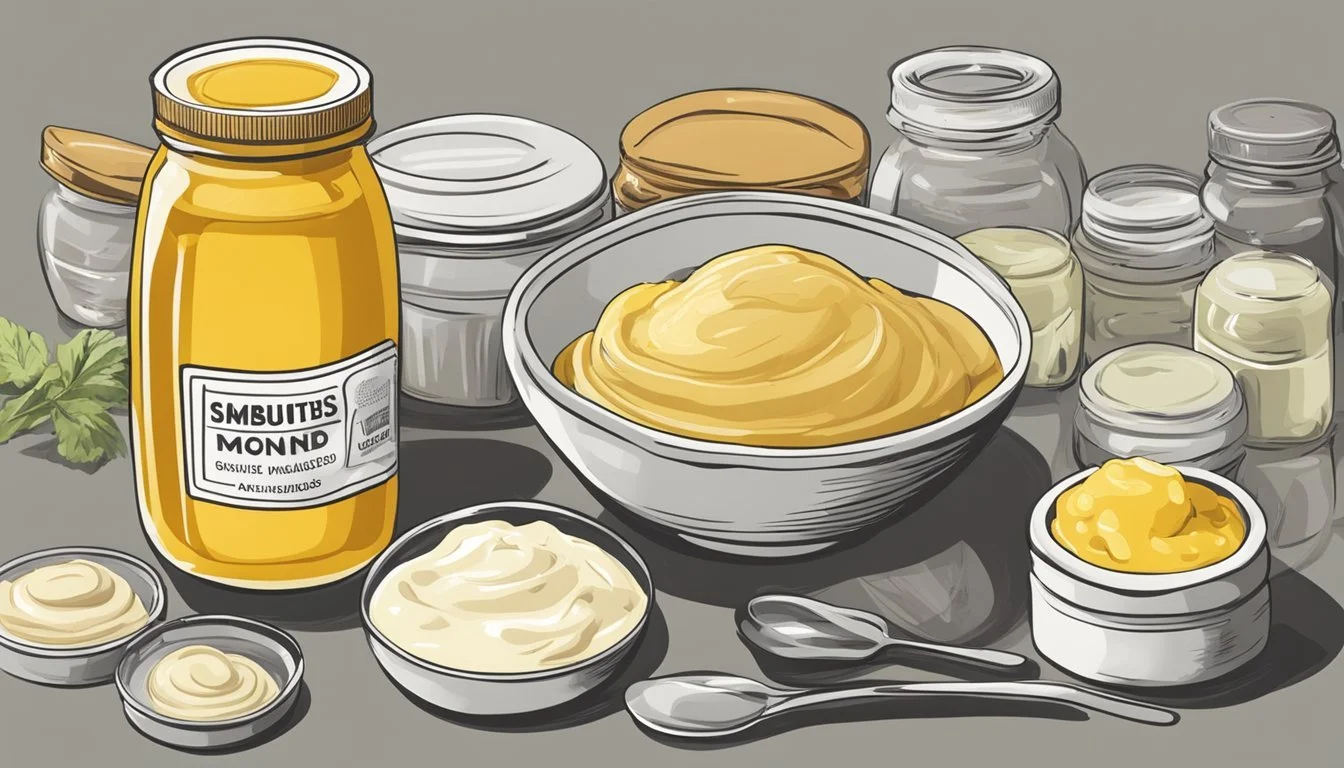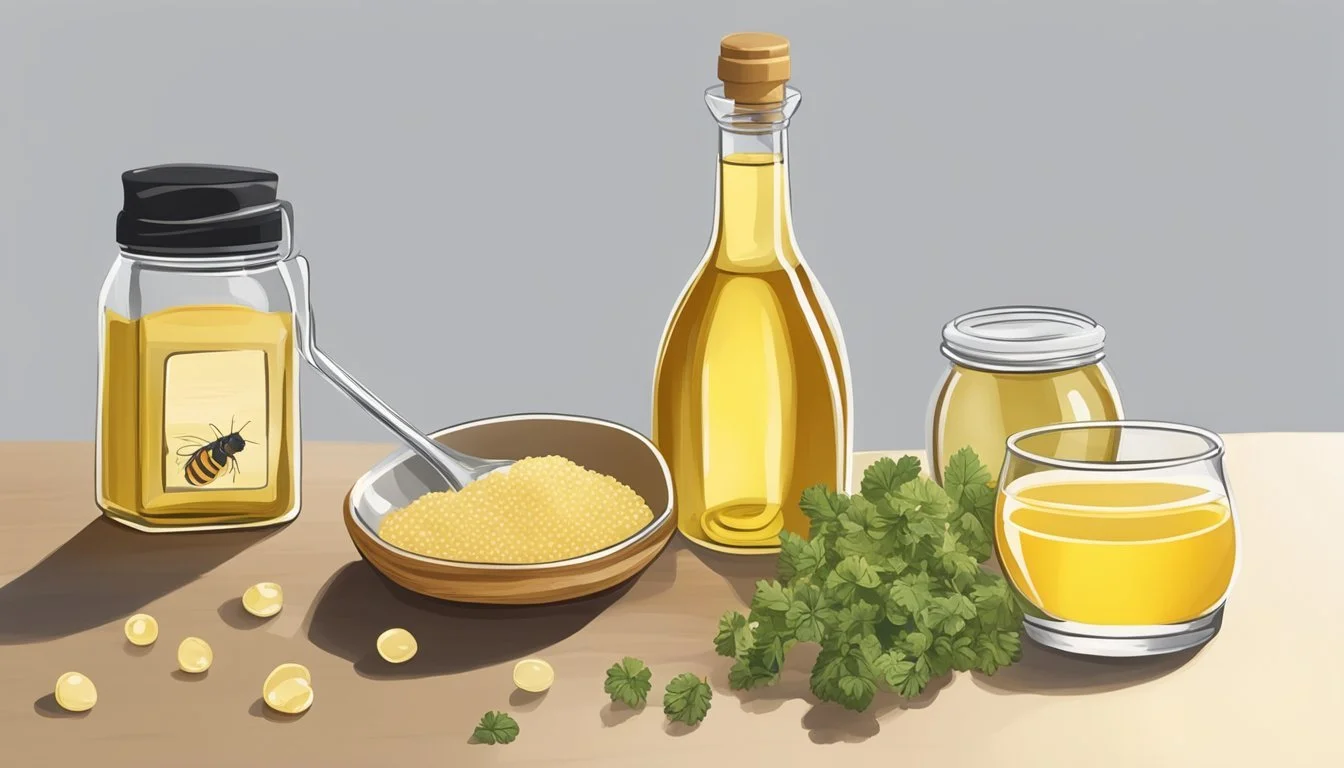Dijon Mustard Substitutes
Top Alternatives for Your Recipes
Dijon mustard, known for its tangy and sharp flavor, is a staple in many kitchens and an essential ingredient in numerous recipes. However, it's not uncommon to find oneself in the middle of food preparation only to discover that the Dijon mustard is all gone. Fortunately, there are several substitutes that can save the day without compromising on flavor. These substitutes are particularly useful considering that Dijon mustard's unique taste is derived from the use of brown mustard seeds and white wine or a similarly acidic liquid, which may not be easily replicated in every kitchen.
When it comes to finding a replacement for Dijon mustard, there are various options to consider depending on the intended use and the flavors in the original recipe. Stone-ground mustard emerges as a popular alternative due to its similar texture and the presence of brown mustard seeds, offering a comparable level of piquancy. Yellow mustard is another readily available substitute, though it boasts a milder flavor profile and a smoother consistency. For recipes that can accommodate an additional hint of sweetness, honey mustard offers a balance of sweet and tangy notes that can mimic the complexity of Dijon mustard in salad dressings, marinades, and sauces.
Familiarity with these alternatives ensures that the absence of Dijon mustard doesn't hinder culinary creativity or the ability to finish a dish as intended. Each substitute brings its own character to the table and can be used in equal measure or adjusted to taste. It's beneficial to understand the nuanced flavors and textures of these replacements to ensure the most suitable choice for a given recipe.
Understanding Dijon Mustard
Dijon mustard is known for its distinct taste and versatility in cooking. This section examines its origins, unique flavor, and nutritional profile.
Origins and Ingredients
Dijon mustard originated in the city of Dijon, the capital of the Burgundy region in France. Traditionally, it is made from brown mustard seeds, white wine, vinegar, and salt. The use of local Burgundy wine contributes to its characteristic sharpness and depth of flavor.
Flavor Profile and Uses
The flavor of Dijon mustard is notably tangy and a bit spicy, setting it apart from its more mild yellow mustard counterpart. It's commonly incorporated into sauces, used as a spread for sandwiches (What wine goes well with sandwiches?), whisked into salad dressings, and applied as a marinade for meats.
Nutritional Information
In terms of nutrition, Dijon mustard is low in calories and fat, making it a favorable condiment choice. It typically contains moderate amounts of sodium and minimal carbohydrates and fiber. Here is a brief nutritional breakdown per teaspoon:
Nutrition Amount Calories 5 kcal Fat 0 g Sodium 120 mg Carbohydrates 0.5 g Fiber 0 g
Common Dijon Mustard Substitutes
When one lacks Dijon mustard for a recipe, suitable replacements are readily available that offer comparable flavors and textures. These substitutes include yellow mustard, stone ground mustard, and honey mustard, each distinctive in taste and usage.
Yellow Mustard
Yellow mustard is a go-to substitute for Dijon mustard, notable for its mild flavor. It is made with white mustard seeds and turmeric, giving it a vibrant yellow color. Easy to find, yellow mustard can directly replace Dijon mustard at a 1:1 ratio in most recipes, from dressings to marinades.
Flavor: Mild, slightly tangy
Best used in: Sandwiches, dressings, casual marinades
Stone Ground Mustard
For those seeking more texture and a deeper flavor, stone ground mustard is an excellent alternative. Packed with brown mustard seeds, its coarser consistency adds a rustic touch to dishes. It maintains the traditional tang while providing a slightly spicier taste than Dijon mustard.
Texture: Coarse, rich
Flavor: Robust, often spicier than Dijon
Best used in: Heartier dishes, as a condiment, in more robust marinades
Honey Mustard
Honey mustard, known for its sweet nuance, can replace Dijon mustard when a touch of sweetness is desired. This substitute blends the mild flavors of traditional yellow mustard with honey, adding a palatable sweetness ideal for dressings or as a dip.
Flavor: Sweet and tangy
Best used in: Sweet dressings, glazes, as a dip for snacks or appetizers
Specialty Mustard Alternatives
When seeking alternatives to Dijon mustard, one can explore specialty mustards and condiments that offer a unique blend of flavor and texture. These options are suitable for a variety of dishes, from sandwiches to marinades.
Spicy Brown Mustard
For those who prefer a robust flavor in their condiments, Spicy Brown Mustard makes an excellent substitute. It shares a similar spice level with Dijon but has a coarser texture that can add depth to sandwiches and burgers. It's a direct swap, maintaining the intensity without overshadowing other ingredients.
Horseradish or Horseradish Sauce
Horseradish offers a sharp, pungent taste that is especially complementary to meats and heavier dishes. When one opts for Horseradish Sauce, it carries an added creaminess that can enhance the mouthfeel in sandwiches. It should be noted that when substituting horseradish or its sauce for Dijon mustard, moderation is key due to its potent spicy profile.
Wasabi
Originating from Japan, Wasabi provides a distinctly sharp and fiery burst of heat which dissipates quickly, unlike the lingering warmth of Dijon mustard. Ideal for sushi, it also pairs well with other dishes for those who enjoy a palate-tingling spice. When using wasabi in recipes calling for Dijon, start with smaller amounts and adjust to suit the desired spiciness.
Homemade Substitutes for Dijon Mustard
Homemade Dijon mustard substitutes allow for personalization to taste preference and desired consistency. Crafting one's own mustard blend can result in a condiment that mirrors the complex flavors of Dijon mustard.
Creating a Basic Mustard Blend
A fundamental homemade mustard starts with quality ground mustard seeds—preferably a mix of brown and yellow for a balanced taste. Mix these with white wine vinegar, a pinch of salt, and if preferred, a small amount of sugar to enhance the flavors. The basic ratio to keep in mind is one part ground mustard to two parts vinegar.
Ingredients:
1/4 cup ground mustard seeds
1/2 cup white wine vinegar
1/2 teaspoon salt
Optional: 1/2 teaspoon sugar
Combine these ingredients in a bowl and whisk them until they form a smooth paste.
Experimenting With Spices
Adding spices such as garlic powder or a touch of habanero can introduce depth and heat akin to Dijon mustard's profile. Start with small amounts — a teaspoon or less — to prevent overwhelming the mustard's base flavors. These additional ingredients should be added to the base blend and thoroughly mixed.
Suggestions for spice additions:
1 teaspoon garlic powder for a robust flavor
1/4 teaspoon habanero powder for a spicy kick
Adjusting the Texture
Dijon mustard is known for its creamy texture. To replicate this, lecithin powder—a natural emulsifier found in egg yolks—can be included. Another option is blending in a bit of mayonnaise to achieve the desired consistency without altering the taste significantly. When using mayonnaise, integrate it in small increments, checking the texture periodically.
Texture modifiers:
1 teaspoon lecithin powder (mixed with a bit of liquid before adding)
1 tablespoon mayonnaise (stirred in gently until reached preferred consistency)
Non-Mustard Dijon Alternatives
When Dijon mustard isn't an option, one can explore a variety of non-mustard ingredients that can mimic the emulsifying and flavoring properties that Dijon mustard provides in recipes.
Mayonnaise as a Base
Mayonnaise serves as an excellent base for creating Dijon-like emulsions. Its creamy texture is ideal for sandwiches and can be augmented with additional ingredients to approach the tanginess of Dijon. For glazes or dressings where mustard's thickness is vital, mayonnaise is a suitable stand-in.
Using Vinegar and Lemon Juice
To replicate Dijon's characteristic tang, one can use vinegar or lemon juice. White wine vinegar, with its sour and complex profile, resembles the acidity in Dijon mustard and is beneficial in marinades and vinaigrettes. Adding lemon juice can provide a fresh, citrus note that brightens dishes in the absence of mustard.
Alternative Condiments
For sauces and dressings, a blend of condiments can substitute for Dijon mustard. Worcestershire sauce, with its savory depth, and soy sauce, with its umami quality, can both complement a dish's flavor profile when mustard is unavailable. Usage depends on the target flavor, with Worcestershire sauce often being better for savory dishes and soy sauce suitable for Asian-inspired recipes.
Adapting Recipes for Substitutes
When replacing Dijon mustard in recipes, one must consider proportions, the differences in taste and consistency the substitute might bring, and how these factors influence the overall dish, especially in cooking, baking, and preparing marinades and dressings.
Understanding Proportions
To maintain the intended flavor balance in a recipe, it is crucial to match the quantity of the substitute with that of Dijon mustard. Substitutes such as yellow mustard, stone ground mustard, and honey mustard can typically be used in a 1:1 ratio. However, one should consider the differing intensities of flavor: yellow mustard tends to be milder, stone ground mustard adds a coarser texture, and honey mustard introduces sweetness.
Substitutes in Cooking and Baking
Substitutes can impact the taste and consistency of savory dishes, baked goods, and protein marinades. In baking, a substitute should not only match the flavor but also the moisture content of Dijon mustard. Stone ground mustard is a preferred alternative for its similar composition, ensuring that consistency in the recipe is maintained. When cooking, especially with proteins, the substitute should complement the other ingredients without overpowering them.
Adjustments for Marinades and Dressings
The role of Dijon mustard in vinaigrettes, marinades, and salad dressings often extends beyond flavor, as it acts as an emulsifier. A substitute's ability to emulsify should be considered. For instance, a coarse stone ground mustard serves as a functional alternative for Dijon in vinaigrettes and dressings. To adjust the taste properly, one might need to account for additional sweetness or spiciness that a substitute could introduce into a marinade or dressing.
Frequently Asked Questions
Navigating the world of mustards can be complex due to the variety of flavors and textures. This section addresses frequently asked questions on substituting Dijon mustard, comparing varieties, and providing practical tips for those experimenting with mustard making at home.
Comparing Mustard Varieties
When it comes to mustard, each variety has a distinct flavor profile and texture that can affect the outcome of a dish. Dijon mustard is known for its creamy texture and sharp, tangy flavor, derived from the use of white wine. Here's a quick comparison of mustard varieties commonly used as substitutes:
Yellow Mustard: Milder, with a bright, clean taste. Ideal for those who prefer less heat.
Spicy Brown Mustard: A bolder choice, it adds a fiery kick to recipes.
Whole Grain Mustard: Adds texture with a robust, slightly less pungent flavor compared to Dijon.
Mustard Type Texture Flavor Profile Best Used in: Yellow Mustard Smooth Mild, slightly acidic Sandwiches, dressings Spicy Brown Mustard Coarse Bold, spicy Marinades, BBQ sauces Whole Grain Mustard Grainy, rustic Robust, tangy Vinaigrettes, hearty dishes
Addressing Common Substitution Concerns
When substituting for Dijon mustard, it's important to consider the impact on the overall flavor and texture of the dish. Substitutes can be used in a 1:1 ratio, but adjustments may need to be made based on the substitute's intensity. For those with allergies, it's crucial to read labels, as ingredients like wine used in Dijon might not be present in other mustards. Availability can also drive the choice of substitute, with yellow mustard being more widely available than other types.
Tips for First-Time Mustard Makers
Creating homemade Dijon mustard can be a rewarding endeavor. It allows for customization and control over the flavor and intensity. Key ingredients typically include mustard seeds, a form of acid like vinegar or wine, and seasonings. Here are a few concise cooking tips for first-time mustard makers:
Grind mustard seeds coarsely for a texture similar to whole grain mustard.
For a smoother paste resembling Dijon, blend the mustard seeds finely.
Taste and adjust seasoning as you go, since homemade mustards can become stronger over time.






